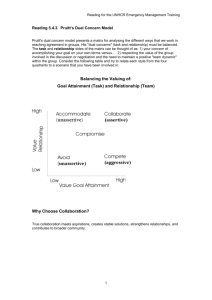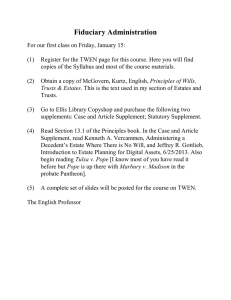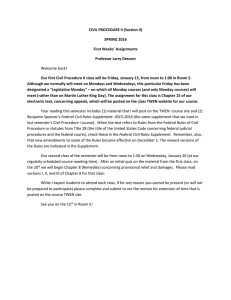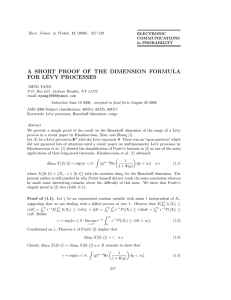Professor Richard C. Reuben
advertisement
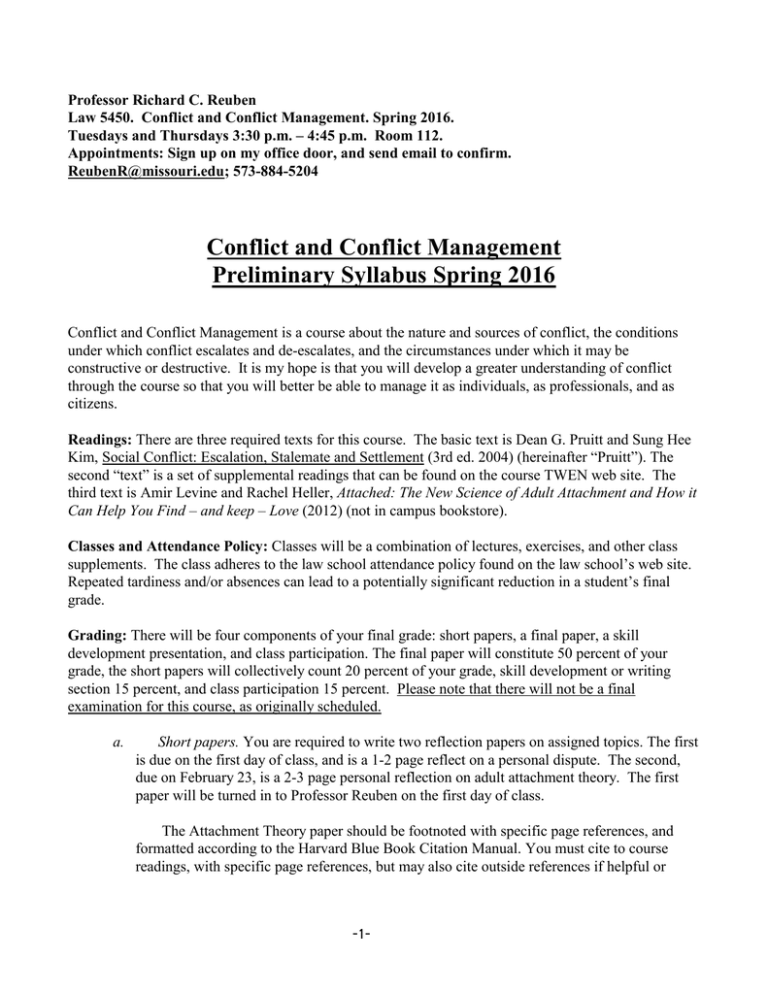
Professor Richard C. Reuben Law 5450. Conflict and Conflict Management. Spring 2016. Tuesdays and Thursdays 3:30 p.m. – 4:45 p.m. Room 112. Appointments: Sign up on my office door, and send email to confirm. ReubenR@missouri.edu; 573-884-5204 Conflict and Conflict Management Preliminary Syllabus Spring 2016 Conflict and Conflict Management is a course about the nature and sources of conflict, the conditions under which conflict escalates and de-escalates, and the circumstances under which it may be constructive or destructive. It is my hope is that you will develop a greater understanding of conflict through the course so that you will better be able to manage it as individuals, as professionals, and as citizens. Readings: There are three required texts for this course. The basic text is Dean G. Pruitt and Sung Hee Kim, Social Conflict: Escalation, Stalemate and Settlement (3rd ed. 2004) (hereinafter “Pruitt”). The second “text” is a set of supplemental readings that can be found on the course TWEN web site. The third text is Amir Levine and Rachel Heller, Attached: The New Science of Adult Attachment and How it Can Help You Find – and keep – Love (2012) (not in campus bookstore). Classes and Attendance Policy: Classes will be a combination of lectures, exercises, and other class supplements. The class adheres to the law school attendance policy found on the law school’s web site. Repeated tardiness and/or absences can lead to a potentially significant reduction in a student’s final grade. Grading: There will be four components of your final grade: short papers, a final paper, a skill development presentation, and class participation. The final paper will constitute 50 percent of your grade, the short papers will collectively count 20 percent of your grade, skill development or writing section 15 percent, and class participation 15 percent. Please note that there will not be a final examination for this course, as originally scheduled. a. Short papers. You are required to write two reflection papers on assigned topics. The first is due on the first day of class, and is a 1-2 page reflect on a personal dispute. The second, due on February 23, is a 2-3 page personal reflection on adult attachment theory. The first paper will be turned in to Professor Reuben on the first day of class. The Attachment Theory paper should be footnoted with specific page references, and formatted according to the Harvard Blue Book Citation Manual. You must cite to course readings, with specific page references, but may also cite outside references if helpful or -1- appropriate. You should use Times Roman font, 1-inch margins all around, and doublespacing. This paper must be turned in on TWEN by 5 p.m. on the due date. b. Skill development. For this component, you will work with a partner on one of the available topics from the syllabus, and present that material as a skill in the class. Your task is to help your colleagues understand how to use and apply the topic as a matter of personal skill. How you do this is largely up to you, although I do have to approve your methodology no later than the end of the day on the Monday of the week of your topic. Options include, but in no way are limited to: a fishbowl exercise, videos/movie clips, music, art, or a skit or exercise that you develop. You will have approximately 30 minutes of class for your skills development presentation, and you will be evaluated on its effectiveness. You are strongly advised to time your presentations, lest you run out of time before you are done. c. Class Participation. I value your class participation and therefore allocate 15 percent of your grade to participation. I am looking for your engagement, insight, sophistication, and other indicia of mastery. Please note that mere attendance is not participation for purposes of the class participation component of your grade. d. Final Paper: You will be required to do a paper of approximately 15 pages analyzing a dispute in which you have been involved, other than as a lawyer. It is due by 5 p.m. on May 2, Stop Day, but may be turned in on TWEN any time after the end of class this semester. Schedule Adjustment: Canceled Thurs. April 7 Make Up TBD Assignment for First Class: Choose any meaningful personal conflict in which you are or have been involved (other than as a lawyer). Write a short description of the conflict (one or two pages at most) to turn in at the beginning of class. Be sure to provide the basic facts, why you think it's important, what made the conflict get better or worse, and if applicable, the way in which it was resolved. Be prepared to make a three-minute presentation about it to the class. Also, please read the assigned readings if you have already purchased the book. -2- Schedule of Classes Dates for topics are approximate and may vary depending upon the pace of class. Asterisks indicate available topics for purposes of the Skills Development component of your grade. Topic 1 (Jan. 19-21). Approaching Conflict: Conflict vs. Dispute Resolution. Pruitt: Chapter 1, Pages 1-9 Supplement: Goleman, et al, The Power of Emotional Intelligence First Short Paper on a Personal Dispute Due Topic 2 (Jan. 26-28). Conflict and Disputes. Pruitt: Chapter 1, Pages 9-14, and Chapter 2 Supplement: Felstiner et al, Naming Blaming and Claiming Opotow, Aggression and Violence (Pages 403-414) Sandy et al., Personality and Conflict (Pages 289-306) Goldstein, The Four Noble Truths Chamallas, Architecture of Bias Flinn et al, Ecological Dominance (Optional) Topic 3 (Feb. 2-4). Constructive vs. Destructive Conflict. Supplement: Deutsch, Cooperation and Competition * Topic 4 (Feb. 9-11). Perceptions, Judgment & the Development of Conflict. Supplement: Siegel, Memory, Trauma, and Recovery Allred, Anger and Retaliation in Conflict: The Role of Attribution Neale & Bazerman, Perspectives for Understanding Negotiation Student Presentation: Topic 5 (Feb. 16-18): Tactical Choices in Conflict. Pruitt: Chapters 3 and 4, Chapter 10 (skim) Start Reading Levine & Heller, Attached. Topic 6 (Feb. 23-25): Moderators of Conflict Pruitt: Chapter 7 (Pages 126-151) Supplement: Coleman, Power and Conflict -3- Lewicki & Wiethoff, Trust ... [and] ...Trust Repair Tyler, Public Mistrust of the Law (skim) Exercise: Adult Attachment Theory Reflection Paper on Attachment Theory Due * Topic 7 (March 1-3): Stability and the Escalation of Conflict Pruitt: Chapters 5 and 6 (pages 101-113) Student Presentation: *Topic 8 (March 8-10): Why Conflict Endures Pruitt: Chapter 8 Student Presentation: *Topic 9 (March 15-17): Stalemate and De-Escalation. Pruitt: Chapter 9 Supplement: Zartman, The Hurting Stalemate and Beyond Kriesberg, De-Escalating Conflict Volcan, Sadat Goes to Jerusalem Student Presentation: *Topic 10 (March 22-24)). Intergroup Conflict Pruitt: Chapter 6 (113-120) Supplement: Fisher, Intergroup Conflict Janis, GroupThink Harvey, The Abilene Paradox Student Presentation: *Topic 11 (April 5-7). International Conflict. Supplement: Coleman, Intractable Conflict Carnegie Comm. Report on Prevention of Deadly Violence (Executive Summary) Volkan, Bloodlines, Deadly Distinctions: The Rise of Ethnic Conflict Ethnic Tents & Large Group Identities . Student Presentation: -4- March 29-31: Spring Break! No Class!! * Topic 12 (April 12-14 ). Capstone Exercise. Middle East Peace: The Future of Hebron Supplement: Background Paper Confidential instructions * Topic 12 (April 19-21). Capstone Exercise: Middle East Peace: The Future of Hebron Topic 13 (April 26-28). Moving Forward with Conflict and Conflict Management Disclosures Statement Regarding Americans with Disabilities Act If you anticipate barriers related to the format or requirements of this course, if you have emergency medical information to share with me, or if you need to make arrangements in case the building must be evacuated, please let me know as soon as possible. If disability related accommodations are necessary (for example, a note taker, extended time on exams, captioning), please register with the Office of Disability Services (http://disabilityservices.missouri.edu), S5 Memorial Union, 882-4696, and then notify me of your eligibility for reasonable accommodations. For other MU resources for students with disabilities, click on "Disability Resources" on the MU homepage. Statement Regarding Academic Integrity Academic integrity is fundamental to the activities and principles of the School of Law. All members of the law school community must be confident that each person's work has been responsibly and honorably acquired, developed, and presented. Any effort to gain an advantage not given to all students is dishonest whether or not the effort is successful. The law school community regards breaches of the School of Law’s Honor Code as extremely serious matters. In the event that you violate our Academic Integrity rules on any portion of the work required for this class, you may expect a failing grade in this course as well as possible disciplinary sanctions ranging from probation to expulsion. When in doubt about plagiarism, paraphrasing, quoting, collaboration, or any other form of cheating, consult the course instructor. Statement Regarding Intellectual Pluralism The University community welcomes intellectual diversity and respects student rights. Students who have questions or concerns regarding the atmosphere in this class (including respect for diverse opinions) may contact the Associate Dean for Academic Affairs at the Law School; the Director of the Office of Students Rights and Responsibilities (http://osrr.missouri.edu/); or the MU Equity Office (http://equity.missouri.edu/), or by email at equity@missouri.edu. All students will have the opportunity to submit an anonymous evaluation of the instructor(s) at the end of the course. Statement Regarding the Taping of Classroom Discussions -5- University of Missouri System Executive Order No. 38 lays out principles regarding the sanctity of classroom discussions at the university. The policy is described fully in Section 200.015 of the Collected Rules and Regulations. In this class, students may not make audio or video recordings of course activity, except students permitted to record as an accommodation under Section 240.040 of the Collected Rules. All other students who record and/or distribute audio or video recordings of class activity are subject to discipline in accordance with provisions of Section 200.020 of the Collected Rules and Regulations of the University of Missouri pertaining to student conduct matters. Those students who are permitted to record are not permitted to redistribute audio or video recordings of statements or comments from the course to individuals who are not students in the course without the express permission of the faculty member and of any students who are recorded. Students found to have violated this policy are subject to discipline in accordance with provisions of Section 200.020 of the Collected Rules and Regulations of the University of Missouri pertaining to student conduct matters. -6-
